This week the Advance CTE and ACTE co-hosted a Congressional briefing with Career Technical Student Organizations, while over two-thirds of the Senate supported a resolution designating February as Career Technical Education (CTE) month. The Senate HELP Committee also held a briefing exploring issues impacting workforce development while lawmakers worked to extend current funding levels through mid-March. In addition, the FCC announced the disbursement of additional connectivity funding while the U.S. Department of Education (ED) made important updates to its College Scorecard.
 Advance CTE and ACTE Host Congressional CTE Month Briefing
Advance CTE and ACTE Host Congressional CTE Month Briefing
On Tuesday, February 15, Advance CTE and the Association for Career and Technical Education (ACTE) hosted a bicameral Congressional briefing featuring learners from several Career Technical Student Organizations (CTSOs):
- Zac Spohn, DECA Collegiate President (Minnesota State University)
- Kartik Tyagi, HOSA International President-Elect (UNC Chapel Hill)
- Maria Deddens, FCCLA First Vice President (East Central High School, IN)
- Gowri Rangu, National TSA President (Longview High School, TX)
Moderated by Advance CTE’s Executive Director Kimberly Green, the briefing highlighted the value of CTE and elevated CTSO learner experiences from both K-12 and postsecondary perspectives. The event also featured remarks from CTE Caucus Co-chairs Rep. Jim Langevin (D-RI) and Sen. Todd Young (R-IN). During Rep. Langevin’s opening comments, the long-time House CTE Caucus co-chair noted, in part, that “A dependable, skilled, and prepared workforce is more critical to our economy than ever, and CTE lays the foundation for students to succeed both now and in the future.” Sen. Young emphasized his ambitions to grow CTE opportunities throughout the nation by co-chairing the Senate CTE Caucus noting that, “3 of 5 jobs in Indiana require more than a high-school diploma but less than a four year degree. More than half of workers in the state do not yet have this level of education.”
Following these remarks from congressional CTE champions, Green posed a series of questions to the CTSO student panel. For Deddens, the FCCLA First Vice President noted that “. . . being a national officer has allowed me to advocate for change in community and state and meet people of diverse backgrounds, cultures and beliefs. Being in CTSOs opens these lines of communication.” National TSA President Rangu noted the impact her first national TSA convention had on her, noting “It was empowering for me to see someone that looked like me [be a national leader] so I felt confident to step into that position and serve as a role model for others.” Tyagi, HOSA’s International President Elect, emphasized the importance of his mentors noting “…[they] instilled the importance of giving back to communities to secure a future of health that has no boundaries and will take care of every individual.” DECA Collegiate President Spohn emphasized how CTE was “. . . the first time I was in a classroom where what I was being taught was applicable to what I wanted to do with my life and career.”
Senate Passes CTE Month Resolution With Overwhelming Bipartisan Support
In the evening following the CTSO panel, the Senate considered a bipartisan resolution designating February as CTE Month. The Senate unanimously passed this resolution without objection which garnered the support of over two-thirds of the Senate with 68 total co-sponsors. In a speech just before the resolution’s passage Senator Kaine (D-VA), the lead sponsor of the resolution remarked , “By formally recognizing CTE Month through this resolution, we hope to bring greater awareness to improving access to high-quality career and technical education for millions of America’s students and our Nation’s ongoing economic competitiveness.” The House recently introduced a similar resolution and is in the process of recruiting additional co-sponsors. Be sure to encourage your Member of Congress to support this resolution by the end of the month by clicking here!
Senate HELP Committee Holds Workforce Development Hearing
On Tuesday, February 15, the Senate Health, Education, Labor, and Pensions (HELP) Committee held a hearing to examine workforce development policies and related strategies collectively aimed at helping workers find and obtain family sustaining employment. The hearing focused particularly on individuals with barriers to employment and the value and impact wraparound support services–like childcare, transportation, and career navigation supports–have in helping workers overcome these existing challenges.
During the question and answer portion of the hearing, Sen. Tim Kaine (D-VA) highlighted his and Sen. Rob Portman’s (R-OH) ongoing sponsorship of the JOBS Act– legislation that, if enacted, would provide Pell Grants for high-quality, shorter-term training programs at postsecondary institutions to more effectively support workers and learners. Advance CTE has long supported this legislation and continues to call for its enactment by Congress this year. A video archive of the hearing, including related written testimony, can be found here.
Congress Passes FY22 Funding Extension Through Mid-March
The formal start of the current federal fiscal year 2022 (FY22) began on October 1, 2021. Since that time, lawmakers in Congress have been unable to come to agreement on full-year funding for the current 2022 federal fiscal year (FY22). Congress has passed a series of short-term funding measures—known as a continuing resolution (CR)—to extend current FY21 funding levels through FY22. To date, these actions have averted a federal government shutdown and lapse in appropriations for laws like Perkins V. However, the most recent of these CRs is set to expire February 18, 2022.
Last week, lawmakers in the House passed another CR to extend current funding levels, yet again, for federal operations and programs through March 11. This measure passed the chamber by a margin of 272-162 and is intended to provide lawmakers additional time to work out a full-year funding agreement for FY22. Late last night, the Senate followed suit passing the legislation by a margin of 65-27. Focus now turns back to Congressional appropriators who are reportedly working to finalize full-year funding for programs like Perkins V’s basic state grant program. As these efforts unfold, Advance CTE will continue to advocate for a comprehensive FY22 funding bill and a robust investment for the CTE.
ED Makes Updates to College Scorecard
Last week the U.S. Department of Education (ED) announced several enhancements to the College Scorecard broadly aimed at making it more useful for prospective learners and their families. Among the changes made is a new earnings threshold metric, which shows the percentage of former students whose earnings exceed those of the average high school graduate. This measure is intended to demonstrate a return on investment for entering postsecondary education. A similar measure is currently being considered as part of forthcoming changes to “gainful employment” rules which ED is currently negotiating with stakeholders. A recent examination of these updated College Scorecard data by Georgetown’s Center on Education and the Workforce found that more than half of students at roughly 30 percent of postsecondary institutions earn less than a high school graduate after 10 years.
FCC Announces Ninth Wave of Emergency Connectivity Fund Commitments
Last week the Federal Communications Commission (FCC) announced a ninth wave of funding commitments totaling over $125 million as part of the Emergency Connectivity Fund (ECF). The $7.2 billion ECF program was authorized as part of the American Rescue Plan and allows eligible schools and libraries to apply for financial support to purchase connected devices like laptops and tablets, Wi-Fi hotspots, modems, routers, and broadband connectivity to serve unmet needs of students, school staff, and library patrons at home during the ongoing pandemic. Securing initial funding for the ECF was one of Advance CTE’s legislative priorities since the beginning of the COVID-19 pandemic. This round of commitments will support 270,00 students by providing funding to over 340 schools, 20 libraries, and 6 consortia who are set to receive 330,000 connected devices and over 39,000 broadband connections. More on the announcement can be found here.
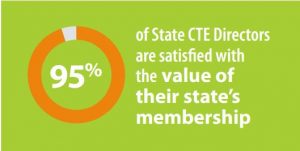
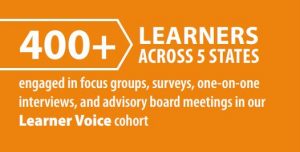 CTE leadership and workforce pipelines, and elevating learner voice. Our members continue to see value in their membership and look for a variety of ways to engage.
CTE leadership and workforce pipelines, and elevating learner voice. Our members continue to see value in their membership and look for a variety of ways to engage.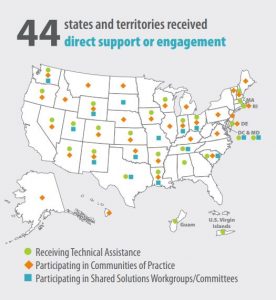 Bringing together our members in person and virtually provides the opportunity to share best practices and lessons learned to address common challenges and improve outcomes for CTE learners. In Spring of 2023 we gathered over 200 CTE leaders to discuss opportunities, challenges, and shared solutions around various topics of the Carl D. Perkins Career and Technical Education Act (Perkins V) in preparation for state plan revisions. Our members were very satisfied with the structure of these meetings, finding it a very useful space to work with their state teams on Perkins processes and gather ideas from their peers. In event evaluation, 100 percent of responding attendees reported that meetings were an “extremely valuable” or “valuable” use of their time.
Bringing together our members in person and virtually provides the opportunity to share best practices and lessons learned to address common challenges and improve outcomes for CTE learners. In Spring of 2023 we gathered over 200 CTE leaders to discuss opportunities, challenges, and shared solutions around various topics of the Carl D. Perkins Career and Technical Education Act (Perkins V) in preparation for state plan revisions. Our members were very satisfied with the structure of these meetings, finding it a very useful space to work with their state teams on Perkins processes and gather ideas from their peers. In event evaluation, 100 percent of responding attendees reported that meetings were an “extremely valuable” or “valuable” use of their time. 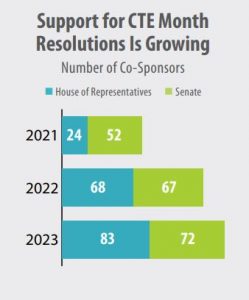




 improving college access and completion rates for underserved students; ensuring equitable resources for learning recovery; expanding educational opportunities for justice-impacted individuals to improve outcomes; advancing equity in career and technical education; and increasing mental health resources in underserved communities. In the plan, ED notes that it hopes to improve data transparency with regards to Perkins V data, host a future webinar series on equity in CTE and propose broadened equity indicators as part of its priorities for potential legislative updates to Perkins V in the years ahead. Read the full plan
improving college access and completion rates for underserved students; ensuring equitable resources for learning recovery; expanding educational opportunities for justice-impacted individuals to improve outcomes; advancing equity in career and technical education; and increasing mental health resources in underserved communities. In the plan, ED notes that it hopes to improve data transparency with regards to Perkins V data, host a future webinar series on equity in CTE and propose broadened equity indicators as part of its priorities for potential legislative updates to Perkins V in the years ahead. Read the full plan 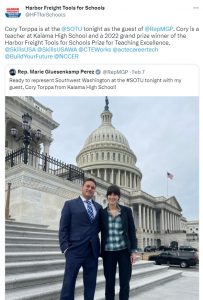 Just two weeks later, First Lady Jill Biden’s guests for the State of the Union (SOTU) address included Kate Foley– a 10th-grade computer-integrated manufacturing student who the First Lady had met last year during a visit to CTE programs in Rolling Meadows High School. In addition, Rep. Glusenkamp Perez (D-WA) brought Cory Toppa, a construction, engineering design, and manufacturing teacher at Kalama High School and the director of CTE for the Kalama school district.
Just two weeks later, First Lady Jill Biden’s guests for the State of the Union (SOTU) address included Kate Foley– a 10th-grade computer-integrated manufacturing student who the First Lady had met last year during a visit to CTE programs in Rolling Meadows High School. In addition, Rep. Glusenkamp Perez (D-WA) brought Cory Toppa, a construction, engineering design, and manufacturing teacher at Kalama High School and the director of CTE for the Kalama school district. 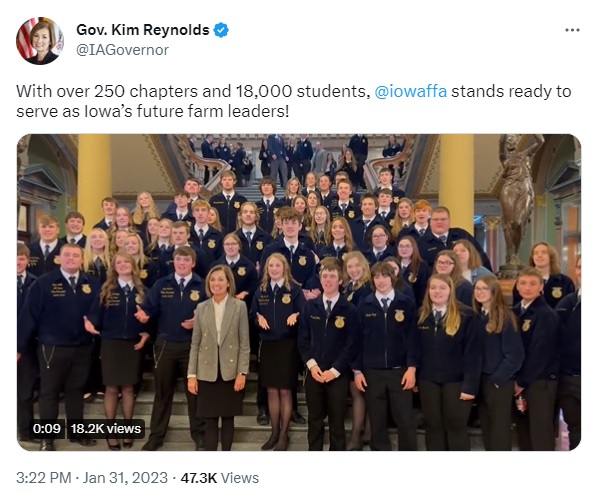
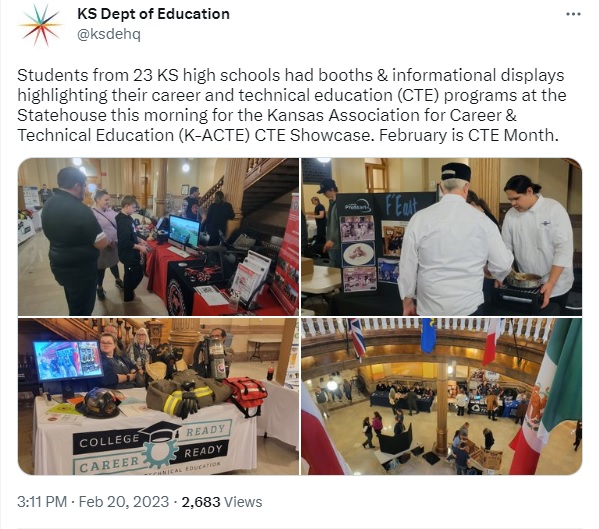
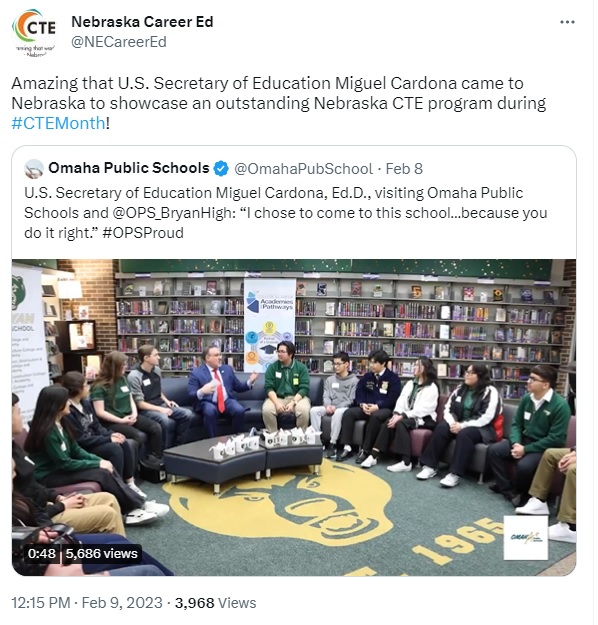
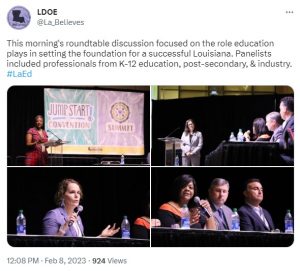
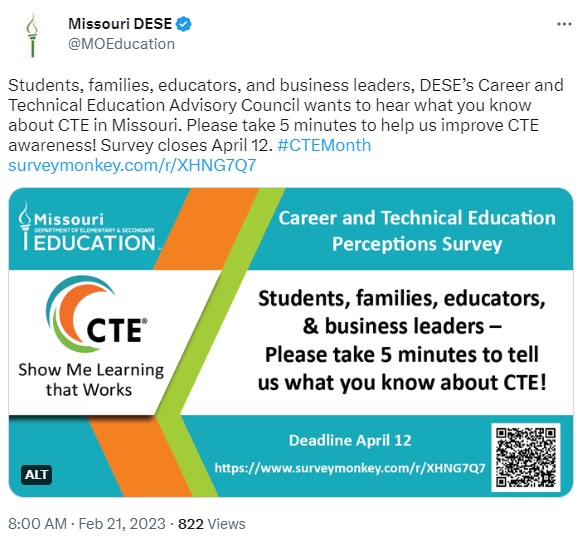
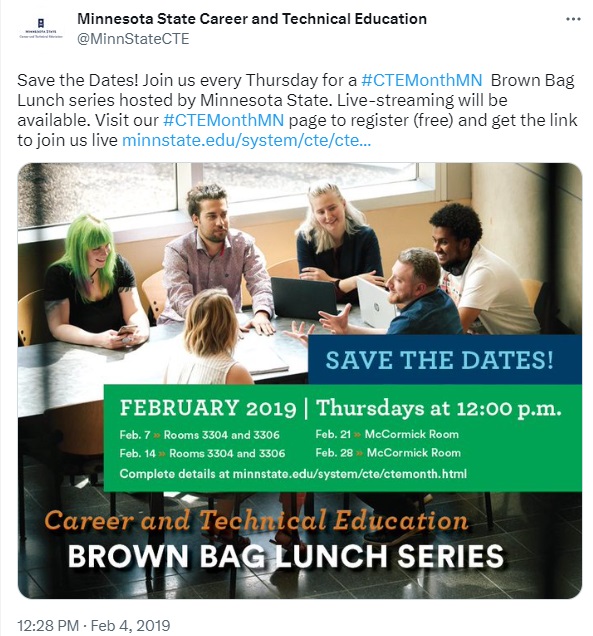
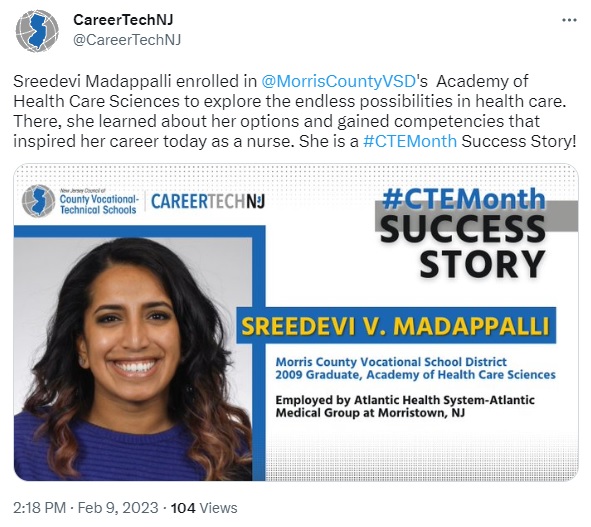
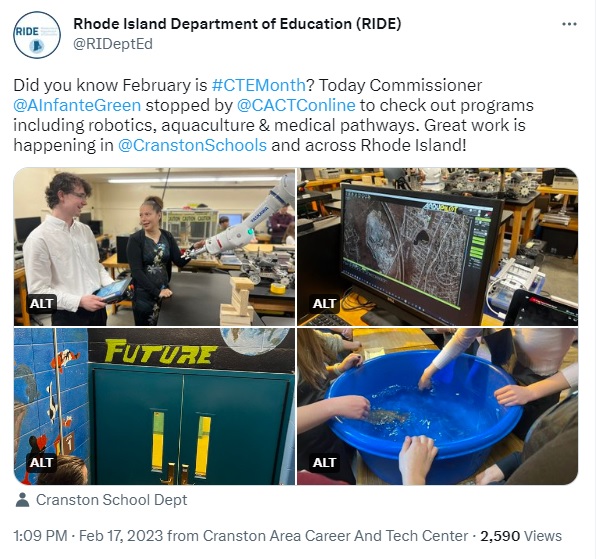
 Short-Term Pell Proposals Introduced
Short-Term Pell Proposals Introduced
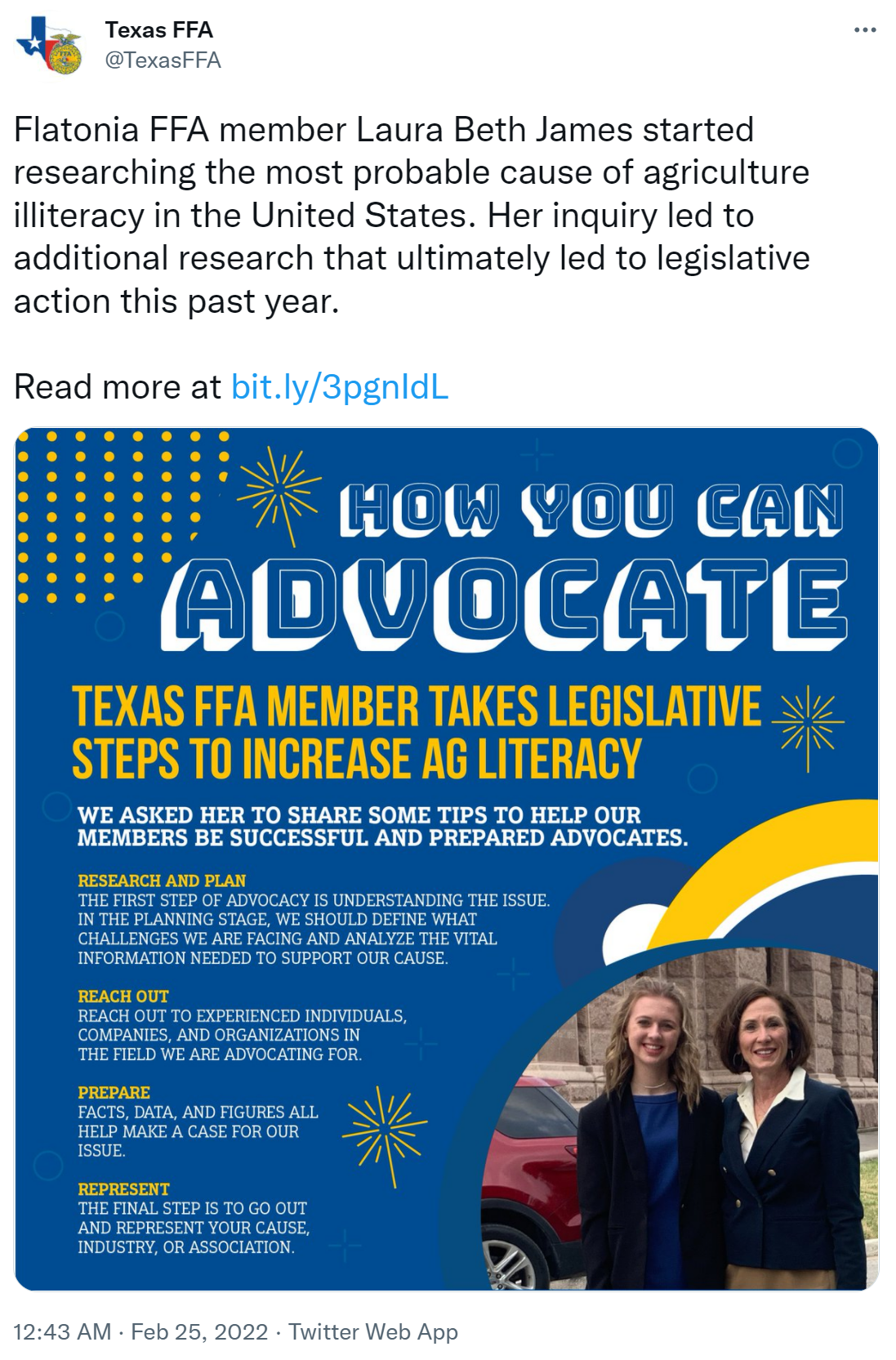 Laura Beth from Texas FFA noticed a barrier to each learner reaching their full potential within their career journey. Her commitment to
Laura Beth from Texas FFA noticed a barrier to each learner reaching their full potential within their career journey. Her commitment to 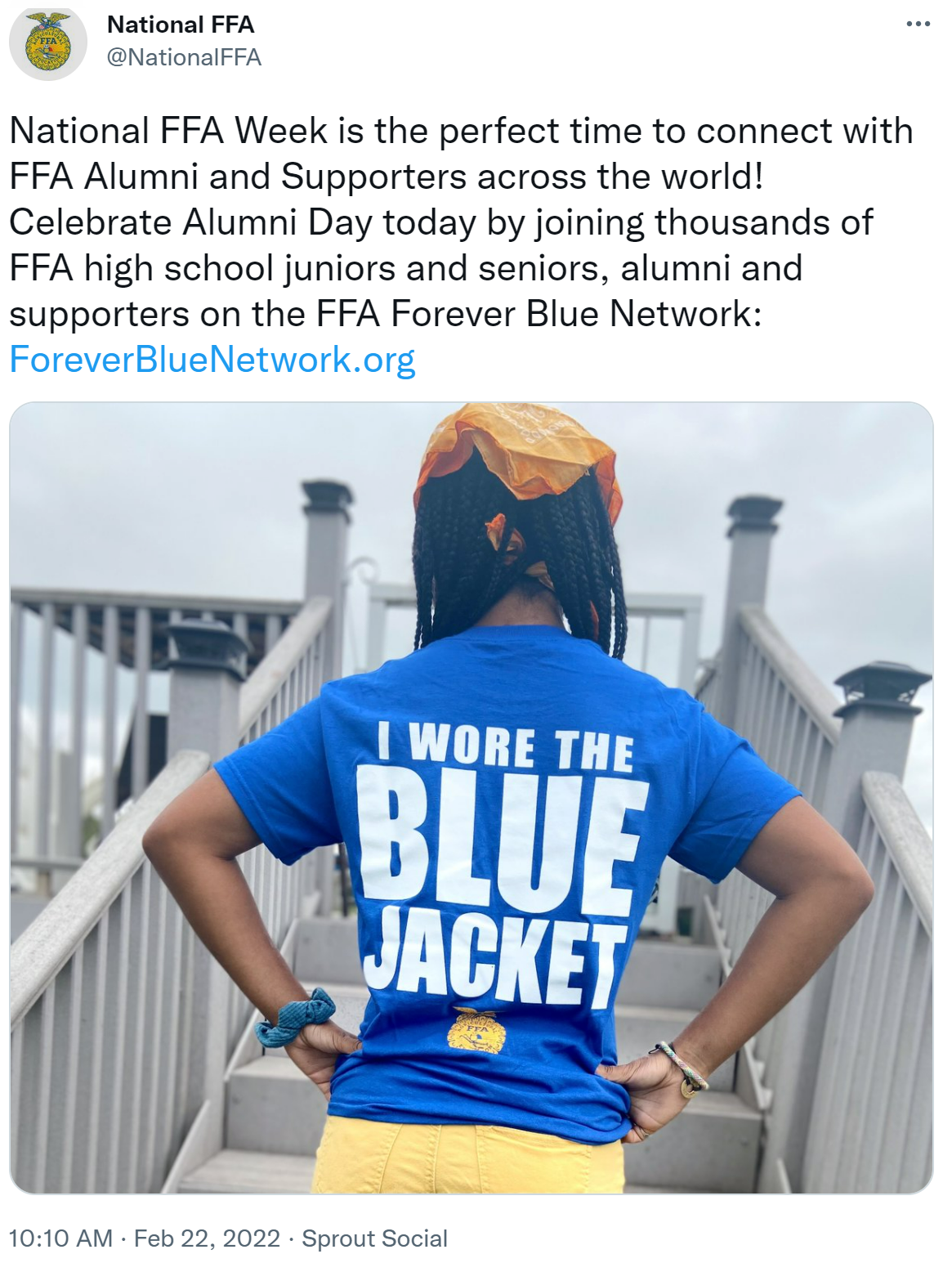
 On Give FFA Day 2022, corporate donors from industry showed their value in the skills learners receive when participating in FFA. Donors participated in donation matching challenges throughout the day to support the CTSO and ultimately the learners served.
On Give FFA Day 2022, corporate donors from industry showed their value in the skills learners receive when participating in FFA. Donors participated in donation matching challenges throughout the day to support the CTSO and ultimately the learners served. 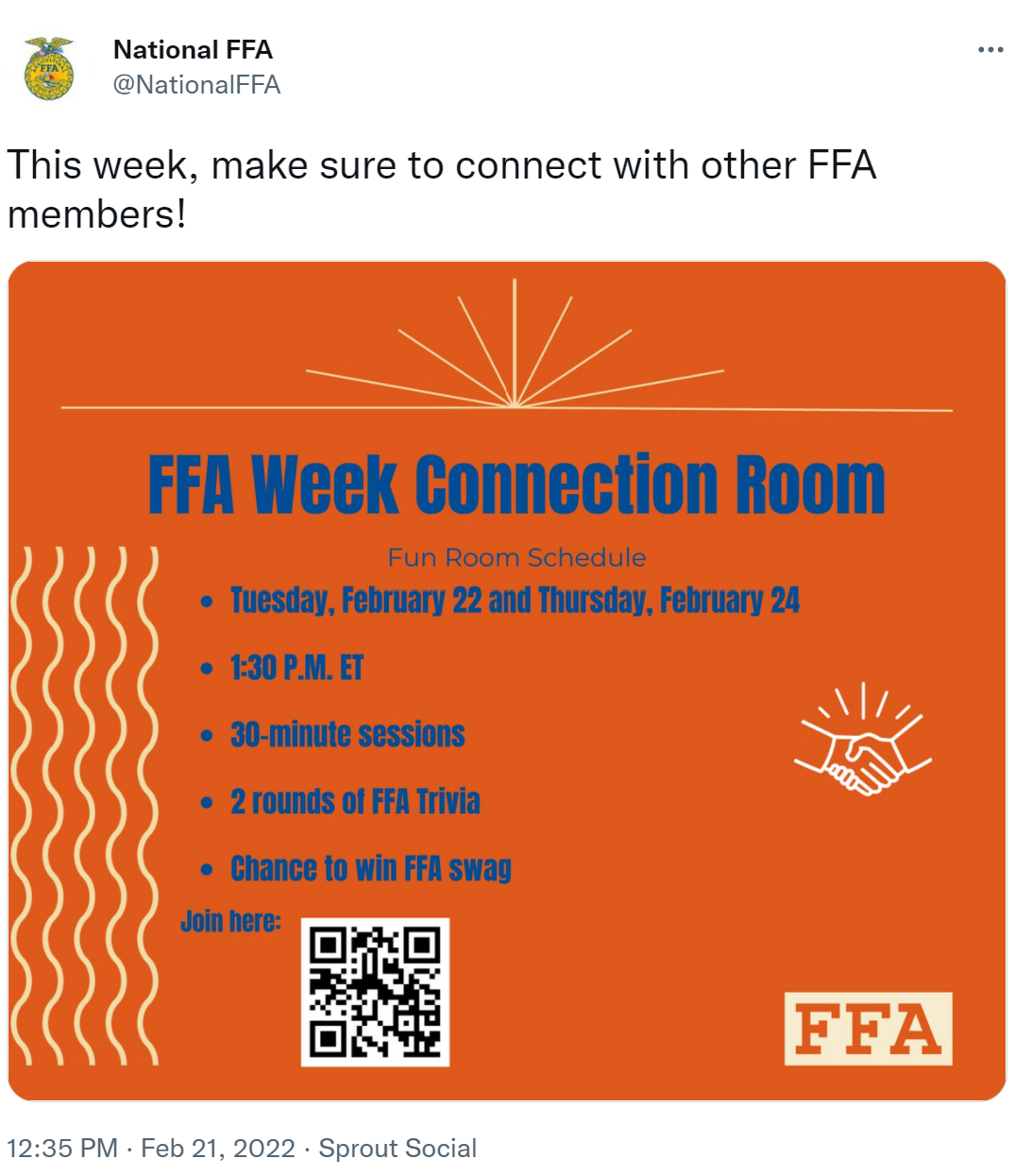 Future dates for National FFA Week are below:
Future dates for National FFA Week are below: Meet Stacy Whitehouse! Stacy is the Senior Associate for Communications and State Engagement at Advance CTE. Stacy works to develop and implement communications and outreach strategies that support state CTE leaders. Some of her most recent initiatives include communications research for
Meet Stacy Whitehouse! Stacy is the Senior Associate for Communications and State Engagement at Advance CTE. Stacy works to develop and implement communications and outreach strategies that support state CTE leaders. Some of her most recent initiatives include communications research for